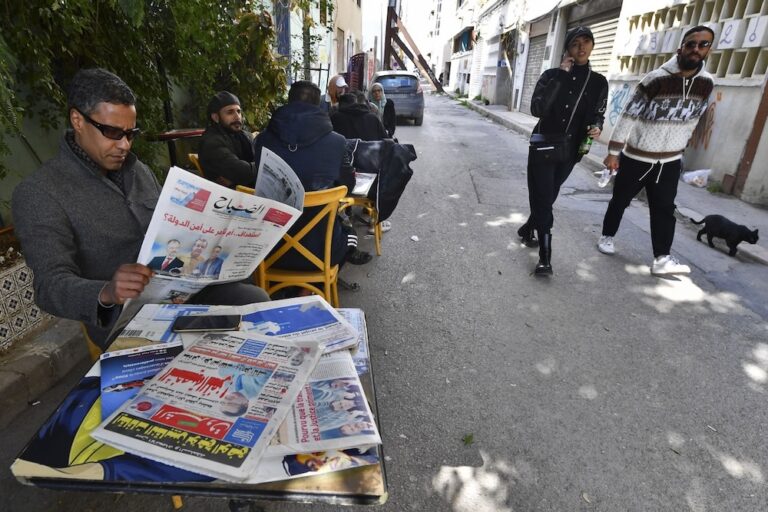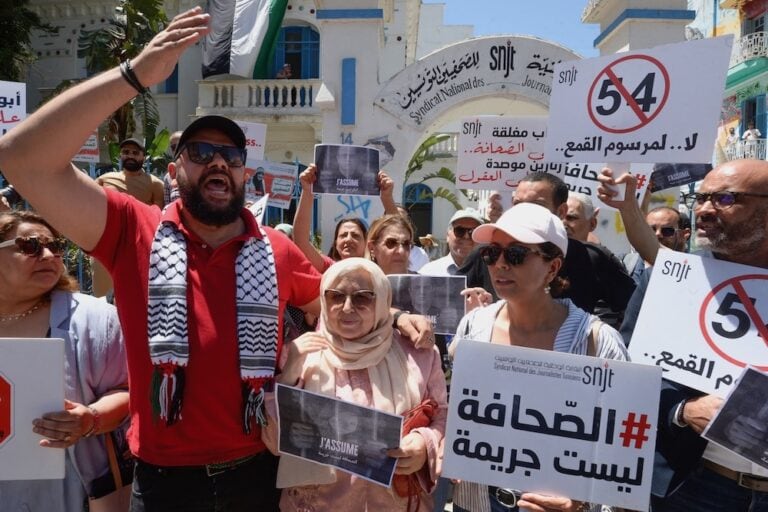The remarkable events in Tunisia call for a redoubling of efforts to restore free expression rights, said the IFEX-TMG, despite the release of Boukadous.
(IFEX-TMG) – 19 January 2011 – The remarkable events in Tunisia, including the announcement of a presidential election to be held this year, call for a redoubling of efforts to fully restore all Tunisian free expression rights, says the International Freedom of Expression Exchange Tunisia Monitoring Group (IFEX-TMG). While welcoming the release of journalist Fahem Boukadous today from prison, the IFEX-TMG calls for an overhaul of the legal system that allowed the journalist to be jailed in the first place, simply for doing his job.
“My feelings of joy are indescribable. Despite repression and life in prison and underground over the past years, I never stopped believing that the Tunisian people would finally turn a new page of democratic rule,” Boukadous told the IFEX-TMG. He was jailed in July on a four-year sentence after reporting on social unrest in the Gafsa region in 2008, in a clear breach of international legal standards. He was released today under the general amnesty for political prisoners.
The IFEX-TMG, a coalition of 20 IFEX members from the Middle East, Africa, Europe and North America, believes that its long running campaign for free expression rights will take on even greater significance in the run up to the vote, and likely beyond it.
As well as monitoring the situation in Tunisia since 2004, the IFEX-TMG currently supports campaigns to challenge political control of the judiciary, ensure the right of civil society groups to gather peacefully and promote media freedoms and the right to information.
“These rights must be secured to ensure the widest possible participation and a fully informed electorate,” said IFEX-TMG Chair Rohan Jayasekera of Index on Censorship in London. “In particular, support must go to independent lawyers and judges challenging the politicised judiciary in Tunisia – the Ben Ali regime’s principal weapon against independent journalists – especially if the courts have any say in future disputes over the election process.”
The rules should be changed immediately to remove the president’s power to choose 60% of the members of the Superior Council of Magistrates, the body responsible for appointing, disciplining and assigning judges, and new elections for the Council must be held imminently. The judiciary will have a central role in fairly addressing any disputes that arise from the voting process, which makes fresh elections for the Council a priority.
Article 8 of the Tunisian Constitution states: “The liberties of opinion, expression, the press, publication, assembly, and association are guaranteed and exercised within the conditions defined by the law.”
The IFEX-TMG supports three demands made by Tunisian judges and lawyers: to change the system for electing members of the country’s Superior Council of Magistrates so the majority of members are elected by judges, and not selected by the President; to give the Council sole responsibility for the management of the judicial system; and to reform the law to prohibit the forced relocation of judges who fail to toe the presidential line.
The coalition also calls on the new government of national unity to end the regime’s policy of obstructing independent trade unions, human rights and civil society groups and the use of court orders and procedural challenges to stop them from meeting. The right to peaceful freedom of association is an essential prerequisite to a fully participatory election.
The interim government must also take immediate steps to guarantee the rights of the media to report on the upcoming election campaign fully, freely and professionally.
The Ben Ali regime deployed a range of methods against the independent press including the seizure of newspapers, financial controls, denial of registration to independent media outlets and physical assault and imprisonment.
The Tunisian authorities must quickly pledge to end these practices: to immediately open up the broadcast media registration process to all; to lift all registration requirements on new print media; and to investigate attacks on journalists, lawyers and civil rights activists, prosecuting the perpetrators.
Only these clear steps will send the appropriate message to those who seek to obstruct free expression and free and fair elections in Tunisia.
“The IFEX-TMG recognises that just as the work of free expression defenders did not end with the conclusion of President Zine el-Abidine Ben Ali’s rule, it will not end with the election of a candidate to replace him,” added Jayasekera. “Many of the restrictive practices at play in Tunisia are framed by established legislation or administrative rules. Tunisian rights advocates will still have to campaign hard to see the laws changed and rules liberalised over the year to come.”
For more on the evolving situation, see regular updates posted at: http://www.facebook.com/IFEXTMG and on Twitter @TunisiaMonitor


